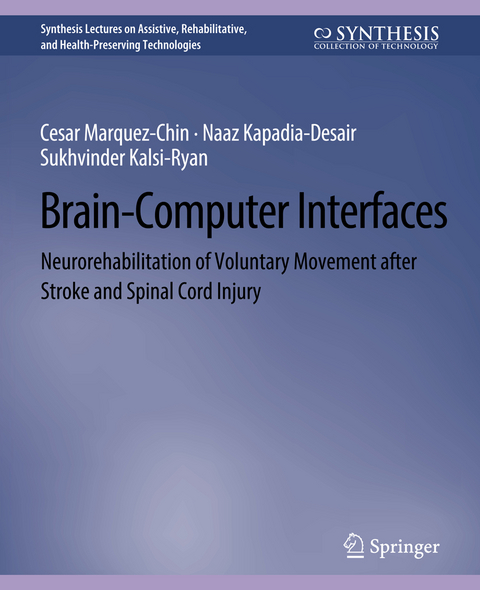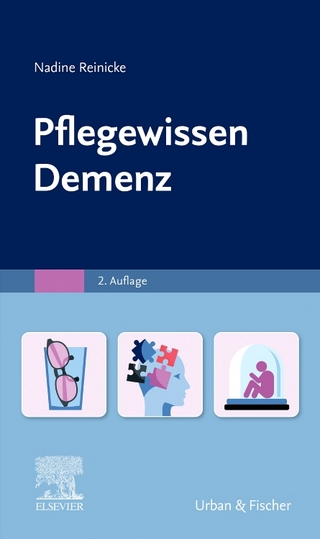
Brain–Computer Interfaces
Springer International Publishing (Verlag)
978-3-031-00480-3 (ISBN)
Cesar Marquez-Chin is a Scientist at the Kite Research Institute, Toronto Rehabilitation Institute - University Health Network. His research, informed by over two decades of working closely with clinicians, is focused on the development, testing, and improvement of practical technologies and interventions to minimize the negative impact on quality of life after paralysis. He has been part of development teams of commercial assistive devices for computer access and prosthetic systems and is a Canadian pioneer in the development of intracranial brain-computer interfaces. His work integrates brain-computer interfacing technologies into the rehabilitation of voluntary movement after spinal cord injury and stroke. He completed his doctoral studies at the Institute of Biomedical Engineering of the University of Toronto, where he is also an Assistant Professor.Naaz Kapadia-Desai completed her doctoral studies at the Rehabilitation Sciences Institute, University of Toronto. She was the recipient of the prestigious Canadian Institutes for Health Research Doctoral Award. She is an experienced clinician and researcher with over 20 years of clinical experience and over 10 years of research experience. She currently holds a Research Associate position at KITE Research Institute, Toronto Rehabilitation Institute - University Health Network, and a Clinical Physiotherapist position with University Health Network. Her research interests include the development and validation of neurorehabilitation therapies and outcome measures specifically targeting upper extremity recovery in individuals with acquired neurological conditions. Her work explores the benefits of Functional Electrical Stimulation to restore function following SCI and Stroke. She has played a pivotal role in the commercialization of the MyndMove FES stimulator. She is an invited expert on the Spinal Cord Injury-High-Performance indicators Team that aims to develop structure, process, and outcome indicators for each prioritized domain for individuals with spinal cord injury.Sukhvinder Kalsi-Ryan is a Clinician Scientist in the field of upper limb assessment and recovery and spine pathology at KITE Research Institute - University Health Network. Her research is oriented to establishing methods to quantify neurological change after injury and studying neu ro-restorative methods to enhance and optimize function for those with neurological impairment. She is a physiotherapist by training, works as a practicing clinician, manages a research program that is focused on the intersection of discovery and clinical application and holds a doctorate degree from the Rehabilitation Sciences Institute of the University of Toronto.
Acknowledgments.- Stroke, Spinal Cord Injury, and Neurorehabilitation.- Functional Electrical Stimulation Therapy: A Closer Look.- Robotic-Assisted Rehabilitation.- Brain-Computer Interfaces.- The Intersection of Brain-Computer Interfaces and Neurorehabilitation.- Implementation of a BCI-Triggered Functional Electrical Stimulation Therapy.- Concluding Remarks.- References.- Authors' Biographies.
| Erscheinungsdatum | 06.06.2022 |
|---|---|
| Reihe/Serie | Synthesis Lectures on Assistive, Rehabilitative, and Health-Preserving Technologies | Synthesis Lectures on Technology and Health |
| Zusatzinfo | VIII, 133 p. |
| Verlagsort | Cham |
| Sprache | englisch |
| Maße | 191 x 235 mm |
| Gewicht | 293 g |
| Themenwelt | Informatik ► Weitere Themen ► Bioinformatik |
| Medizin / Pharmazie ► Physiotherapie / Ergotherapie ► Orthopädie | |
| Naturwissenschaften ► Biologie ► Genetik / Molekularbiologie | |
| Technik ► Medizintechnik | |
| ISBN-10 | 3-031-00480-9 / 3031004809 |
| ISBN-13 | 978-3-031-00480-3 / 9783031004803 |
| Zustand | Neuware |
| Haben Sie eine Frage zum Produkt? |
aus dem Bereich


